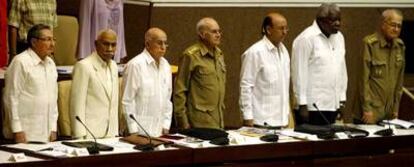Cuba fueled by corruption, says US Interests Section
Batches of cablegrams claim that "mafias" run the communist government
Corruption in Cuba is so far-reaching that it is endemic among high-ranking public officials, members of the Cuban Communist Party (PCC) and unaffiliated professionals, according to several reports by the US Interests Section in Havana.
The practices include illegal commissions charged by public workers in exchange for favors, where the money is deposited in foreign bank accounts. A Swiss banker is quoted in one of the cablegrams as saying that "like any place in the world, a $1 million contract means [for the Cuban public worker] $100,000 in the bank."
That report, dating from 2006 but whose contents have been confirmed by later cables, underscores that these workers are not so much members of the revolutionary elite but rather "pragmatics," who have carved out their own niche within the rigid Communist system.
"In most Latin American countries corruption means that one person steals $11 million, in Cuba it means that 11 million Cubans steal one dollar."
The cables released by WikiLeaks and published in EL PAÍS mention General Julio César Regueiro as being "widely rumored to be corrupt." According to US sources in Havana, some state installations are in fact "run by mafias." One Cuban told the political attaché at the US Interests Section that the director of a bread-distribution center placed his friends in decisive centers and now controls the entire state network of bakeries.
Despite several campaigns and official sanctions against corrupt practices, including the deployment of 30,000 youths from the PCC and the Student League to inspect gas stations and account books in the hotel sector, corruption continues to "reign" in Cuba, where most of the 11.2 million inhabitants work for state companies.
Former Spanish ambassador Carlos Alonso told US diplomats that "corruption is necessary to survive. And when in most Latin American countries corruption means that one person steals $11 million, in Cuba it means that 11 million Cubans steal one dollar."
To the US, which profoundly opposes Castro's regime, the state monopoly means that "corruption and theft are the same thing." A cable notes that corrupt practices include bribes, misappropriation of state resources and cooked accounting books. Many of the potentially most profitable positions are obtained by bribing the public official who makes the decision, the cables say. "For instance, a job with access to a gas station can cost thousands of dollars, because it will allow the beneficiary to traffic with fuel."
Meanwhile, police officers are "famous for accepting bribes" after charging drivers with a myriad of transgressions, writes Michael Parmly, who headed the diplomatic office in Havana between 2005 and 2008. Parmly adds that these officers are so corrupt that the government renews their ranks with unspoiled recruits from the east, but after some time the new officers are just as corrupt as the old, and the government has to bring in another wave to replace them.
A 2009 cable considers that "corruption in Cuba is an accepted tool for survival" and notes that Cubans earn an average of $18 a month. The report also underscores that practices considered corrupt in the US, such as influence peddling or conflicts of interest, are normal procedures in Cuba, and that authorities tolerate small-time survival corruption but act with severity when they learn about bigger cases.

Tu suscripción se está usando en otro dispositivo
¿Quieres añadir otro usuario a tu suscripción?
Si continúas leyendo en este dispositivo, no se podrá leer en el otro.
FlechaTu suscripción se está usando en otro dispositivo y solo puedes acceder a EL PAÍS desde un dispositivo a la vez.
Si quieres compartir tu cuenta, cambia tu suscripción a la modalidad Premium, así podrás añadir otro usuario. Cada uno accederá con su propia cuenta de email, lo que os permitirá personalizar vuestra experiencia en EL PAÍS.
¿Tienes una suscripción de empresa? Accede aquí para contratar más cuentas.
En el caso de no saber quién está usando tu cuenta, te recomendamos cambiar tu contraseña aquí.
Si decides continuar compartiendo tu cuenta, este mensaje se mostrará en tu dispositivo y en el de la otra persona que está usando tu cuenta de forma indefinida, afectando a tu experiencia de lectura. Puedes consultar aquí los términos y condiciones de la suscripción digital.








































